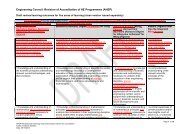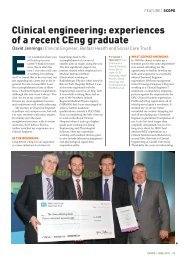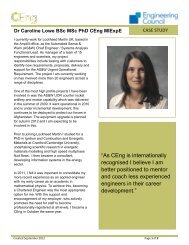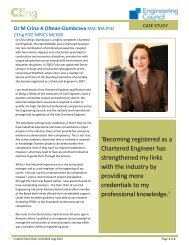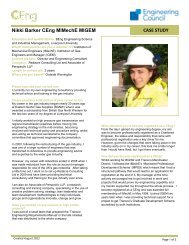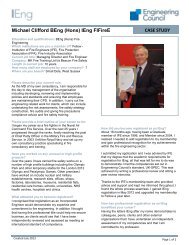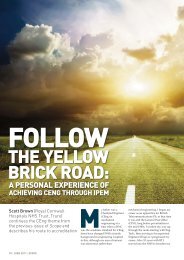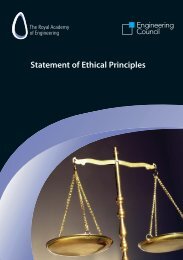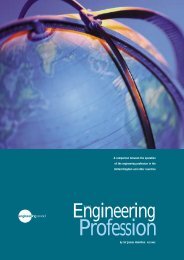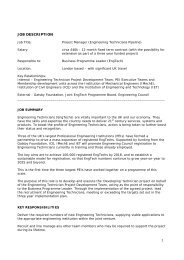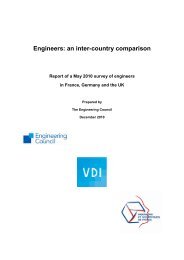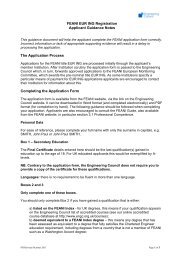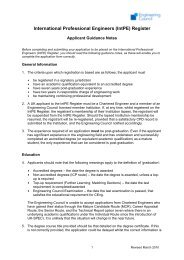An Engine for Change - A Chronicle of the Engineering Council
An Engine for Change - A Chronicle of the Engineering Council
An Engine for Change - A Chronicle of the Engineering Council
Create successful ePaper yourself
Turn your PDF publications into a flip-book with our unique Google optimized e-Paper software.
VERDICT 185represent <strong>the</strong> engineering pr<strong>of</strong>ession both in <strong>the</strong> UK and internationally. It also, <strong>for</strong> example,committed <strong>the</strong> Government to look to <strong>the</strong> EngC “…to <strong>of</strong>fer advice on national issues such aseducation, training, industrial competitiveness, risk, <strong>the</strong> environment…where engineering is amajor factor”.Un<strong>for</strong>tunately, nothing much came <strong>of</strong> this. Maybe because <strong>of</strong> <strong>the</strong> difficulties <strong>of</strong> developing<strong>the</strong> ‘New Relationship’ a sufficiently strong political will was absent in <strong>the</strong> EngC Senate, orelse <strong>the</strong> importance <strong>of</strong> <strong>the</strong> MOU was insufficiently recognised.Be that as it may, <strong>the</strong> whole future <strong>of</strong> <strong>the</strong> EngC was about to be overtaken by events. A freshinitiative, which we describe fully in Chapter 7, was launched in 1999 with a steer from anew (now Labour) Government Minister to ‘add value to <strong>the</strong> wider engineering community’.There was a subtle change here from serving <strong>the</strong> pr<strong>of</strong>ession to serving <strong>the</strong> community. Afterintensive, protracted and wide-ranging discussions <strong>the</strong> upshot, at <strong>the</strong> beginning <strong>of</strong> 2002, was<strong>the</strong> division <strong>of</strong> <strong>the</strong> EngC into two parts. One was <strong>the</strong> <strong>Engine</strong>ering and Technology Board todevelop <strong>the</strong> community idea – taking in some existing ef<strong>for</strong>ts such as Neighbourhood<strong>Engine</strong>ers and Industry Affiliates. The o<strong>the</strong>r was, with a fresh Charter, <strong>the</strong> <strong>Engine</strong>ering<strong>Council</strong> (UK) which was now confined to <strong>the</strong> regulation <strong>of</strong> <strong>the</strong> pr<strong>of</strong>ession in <strong>the</strong> UK and itsrepresentation internationally.Appraisal <strong>of</strong> 20 Years’ ActivitySo at <strong>the</strong> end <strong>of</strong> <strong>the</strong> day, can any objective judgement be passed on <strong>the</strong> success or o<strong>the</strong>rwise<strong>of</strong> <strong>the</strong> <strong>Engine</strong>ering <strong>Council</strong> from <strong>the</strong> granting <strong>of</strong> its Charter in November 1981 to itsreplacement in February 2002 by <strong>the</strong> ETB and <strong>the</strong> EC(UK)?By <strong>the</strong> nature <strong>of</strong> things it is difficult to claim a one-to-one correlation between any particularactivity <strong>of</strong> <strong>the</strong> EngC and a perceived improvement on <strong>the</strong> national scene - because it canalways be argued that o<strong>the</strong>r, possibly more powerful, economic and cultural influences wereat work. However, to take just one example, that <strong>of</strong> <strong>the</strong> WISE campaign, national data showthat during <strong>the</strong> life <strong>of</strong> <strong>the</strong> EngC <strong>the</strong> proportion <strong>of</strong> women entering engineering degree coursesrose from about 6% to more than 14%. Not all <strong>of</strong> this may be attributable to <strong>the</strong> ef<strong>for</strong>ts <strong>of</strong> <strong>the</strong>EngC, but it would be perverse to argue that none <strong>of</strong> it was, bearing in mind <strong>the</strong> evidentsuccess <strong>of</strong> <strong>the</strong> campaign on <strong>the</strong> ground.Opinions <strong>of</strong> ContributorsTo attempt an all-round assessment <strong>of</strong> <strong>the</strong> EngC’s impact, questionnaires were circulated tocurrent and previous EngC <strong>Council</strong> and Senate members, Directors-General and Directors,o<strong>the</strong>r EngC staff and <strong>Engine</strong>ering Institutions. A number <strong>of</strong> personal interviews were alsoundertaken.Two <strong>of</strong> <strong>the</strong> questions asked were:1. What had been <strong>the</strong> EngC’s ‘Successes’, ‘Partial Successes’ and ‘Shortcomings’?2. What should be its future priorities?We provide below a summary representing <strong>the</strong> consensus <strong>of</strong> opinion in each case. Although<strong>the</strong> answers to <strong>the</strong> second question have largely been taken over by events, <strong>the</strong> responses mayprove to be useful to <strong>the</strong> EngC’s successors and o<strong>the</strong>r bodies.© <strong>Engine</strong>ering <strong>Council</strong> UK 2004



